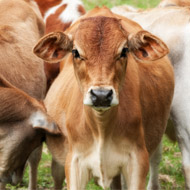The project will examine how the wider population is exposed to bacteria from dairy cattle.
Aims to boost understanding of drug resistant bacteria from cattle
A grant of £1.5 million has been awarded to researchers at The University of Bristol to carry out research on drug resistant infections.
Awarded as part of the ‘AMR in the Real World Programme,’ the money will be used to test if AMR bacteria from cattle can cause drug resistant infections in humans.
Project leader, Dr Matthew Avison, explains: “There is little doubt that over-using antibiotics in farm animals and pets increases the number of AMR bacteria in those animals, just as it does in humans. There is also strong evidence that AMR bacteria present in farm animals can spread to humans having close physical contact with them (e.g. farm workers).
“However, there is considerable debate about the extent that AMR bacteria can spread more widely – for example when people eat food contaminated with bacteria from animals or interact with environments contaminated with animal wastes. Our research project will add much needed data to the debate.”
The project will examine how the wider population is exposed to bacteria from dairy cattle, for example while walking on public footpaths.
The researchers also seek to determine the effect of antibiotic use in humans, and what happens when that antibiotic use is reduced.
Professor Alastair Hay, a GP and professor of primary care in the University of Bristol’s School of Social and Community Medicine said: “The recent and very welcome news that the use of antibiotics by GPs and nurses in primary care is reducing provides a ‘natural experiment’.
“We will look to see if these reductions in antibiotic prescribing are translating into reduced rates of antibiotic resistant urine infections. Urine infections are the most common bacterial infection, and the most common antibiotic resistant infection treated by the NHS.
“If we find that a reduction in antibiotic prescribing has led to a reduction in the number of antibiotic resistant urine infections, it will be positive news for patients, GPs and nurses in primary care – suggesting they are ‘on the right track’.”
The ‘AMR in the Real World Programme’ is a cross-council initiative that is currently focusing on resistant bacteria of humans and animals.
It was created following the government’s Five Year Antimicrobial Resistance Strategy (2013-2018) that sets out the actions and research needed to tackle AMR.







 Birmingham Dogs Home has issued an urgent winter appeal as it faces more challenges over the Christmas period.
Birmingham Dogs Home has issued an urgent winter appeal as it faces more challenges over the Christmas period.
